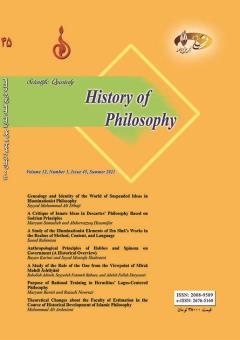A Study of the Illuminationist Elements of Ibn Sīnā’s Works in the Realms of Method, Content, and Language
Subject Areas : New analyses and findings in the field or Oriental wisdom
1 - Professor at the Islamic Philosophy and Kalam Department of the Shiraz University, Shiraz, Iran
Keywords: Ibn Sīnā, Suhrawardī, Oriental wisdom, Illuminationist philosophy, gnosis,
Abstract :
Although Ibn Sīnā was the master of Peripatetic philosophers, he also provided the bases for the development of Illuminationist philosophy. In terms of methodology and epistemology, through introducing Oriental wisdom, which, irrespective of the Greeks’ views, is his own specific school of philosophy, and also through employing certain terminology, principles, and arguments which are associated with Illuminationism, he prepared the context for the revival and growth of Illuminationist philosophy by Suhrawardī. Ibn Sīnā’s critical mind and spiritual worthiness during his short life efficiently paved the way for the surge of Islamic philosophy and wisdom towards Illuminationist philosophy and then the Transcendent Philosophy in terms of methodology, content, and language. Suhrawardī mainly emphasizes the differences between his school of philosophy and that of Ibn Sīnā and his Peripatetic followers and introduces the beginning of his philosophy as the end of Peripatetic philosophy. However, we can confidently claim that his philosophy is to such a large extent influenced by Ibn Sīnā’s that one can consider Suhrawardī’s school to have been the outcome of the natural growth of Sinan philosophy in the course of time. Through highlighting gnostic and intellectually intuitive (or what was later called Illuminationist) elements in Ibn Sīnā’s available works, the present paper aims to demonstrate that Suhrawardī’s debt to Ibn Sīnā in all the three fields of methodology, content, and language is much greater than what is commonly assumed.
ابنرشد، ابوالولید (1986م) تهافت التهافت، تصحیح بوییژ، بیروت: دارالمشرق.
ابن¬سینا (1363) الشفاء، تحقيق الاب قنواتي و سعيد زائد، تهران: ناصرخسرو.
ابن¬سینا (1379) النجاة من الغرق فی بحر الضلالات، تحقیق محمدتقی دانشپژوه، تهران: دانشگاه تهران.
ابن¬سینا (1403ق) الاشارات و التنبیهات، بهمراه شرح خواجه نصیر، تهران: دفتر نشر کتاب.
ابن¬سینا (1400ق) مجموعه رسائل ابن¬سینا (مشتمل بر: تفسیر سورۀ فلق، الطیر، العشق، عیون الحکمة، حی بن یقظان و الحث علی الذکر)، قم: بیدار.
ابن¬سینا (بیتا) منطق المشرقیین، قاهره: المکتبة السلفیة.
ابنطفیل (1360) زنده بیدار (حی بن یقظان)، ترجمه بدیعالزمان فروزانفر، تهران: بنگاه ترجمه و نشر کتاب.
بدوی، عبدالرحمن (1947م) ارسطو عند العرب (مشتمل بر الحکمة المشرقیة، الانصاف، شرح اثولوجیا و شرح کتاب اللام)، قاهره: مکتبة النهضة المصریة.
پورجوادی، نصرالله (1380) اشراق و عرفان، تهران: مرکز نشر دانشگاهی.
رحیمیان، سعید (1397) مبانی عرفان نظری، تهران: سمت.
سهروردی، شهابالدین (1373) مجموعه مصنفات شیخ اشراق، ج3، تحقیق سیدحسین نصر، تهران: انجمن حکمت و فلسفه ایران.
سهروردی، شهابالدین (1397) سه رساله شیخ اشراق، تحقیق نجفقلی حبیبی، تهران: انجمن حکمت و فلسفه ایران.
سهروردی، شهابالدین (1972م) مجموعه مصنفات شیخ اشراق، ج2، تحقیق هانری کربن، تهران: انجمن حکمت و فلسفه ایران.
شایگان، داریوش (1371) هانری کربن آفاق تفکر معنوی در اسلام ایرانی، ترجمه باقر پرهام، تهران: آگاه.
شهرزوری، شمسالدین (1372) شرح حکمة الاشراق، تصحیح حسین ضیایی تربتی، تهران: پژوهشگاه علوم انسانی.
کربن، هانری (1387) ابنسینا و تمثیل عرفانی، ترجمه انشاءالله رحمتی، تهران: جامی.
مدکور، ابراهیم (1974م) «بین السهروردی و ابنسینا»، در التذکاری للسهروردی، مصر: دارالکتاب.
نصر، سیدحسین (1359) نظر متفکران اسلامی در مورد طبیعت، ترجمه احمد آرام، تهران: خوارزمی.

